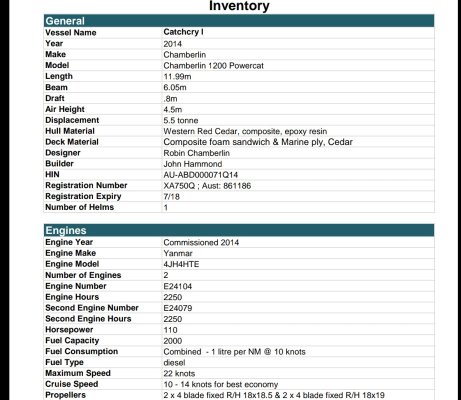rslifkin wrote:
That's what is happening, for sure.
Thinking about Hippo's back of the envelope calculations: I have not yet heard back from the NZ boat builder I linked to yet (the 10.4m electric hybrid cat), but looking up the variable speed diesel generators available here, a 50KWa one running at full load uses 10.7 litres/hour.
That's the same as a fixed speed generator would consume when producing 25kw.
What we don't know is in any (say) 10-hour period of cruising, and running electric engines from the batteries at an efficient cruise speed, how many hours of generator run time would that entail (assuming we run on batteries until they need charging, running the generator while underway until the batteries are changed, etc.)?
You need to look at the energy equation for the system. That's the inescapable physics involved, and the clearest way to assess efficiency.
- It takes a certain amount of energy to move the boat at a certain speed. It doesn't matter if it's an electric or diesel or peddle power, it takes the same amount of energy to move the boat that speed. Don't be fooled into thinking that electric propulsion is more efficient when you are really just moving the boat slower. Moving slower reduces the energy requirement, not switching to an electric drive.
- That energy has to come from somewhere, and let's look at the case of direct diesel drive vs this variable speed generator. First, a diesel consumes fuel 90% based on the HP or kWh power output, not based on rpm, and not based on engine size. There is some variation, but it's quite small. With direct diesel drive, the engine shaft power produced directly drives the prop. So power produced (shaft power) is directly converter to boat movement. I'm ignoring shaft friction and prop efficiency because they will be the same regardless of electric vs direct drive.
- Now with the variable speed generator, or a fixed speed generator for that matter, the engine shaft power generates electricity with let's say a 10% loss. That electricity then drives an electric motor again creating shaft power, but with another 10% loss. If you have a really good generator end, really good VFD electronics, and a really good electric motor, the loss from diesel engine shaft power to electric motor shaft power might only be 15% instead of 20%. But the bottom line is that only 85% of the diesel shaft power appears as shaft power to the prop to create boat movement.
So you have created a less efficient system, not a more efficient system. The advantage is that it can be powered by solar in addition to the diesel generator. If you can provide 15% of your propulsion energy via solar, then you will have recovered the lost 15% and be back to break even. At this point you will have a significantly more complex and expensive propulsion system that is equally efficient to a direct drive. If you can produce 25% of your propulsion power from solar, you now have a boat that is 10% more efficient. Also keep in mind that captured solar energy has to be stored in a battery, removed from the battery, and fed through the same VFD+electric motor, so those losses need to be accounted for.
But I ran a few numbers in this or another thread on the subject and it looked like solar that can realistically be collected on a boat is only about 10% of the propulsion energy. There were some assumption about "duty cycle", i.e. how much time you spend underway vs available solar charging hours.
Someone noted that electric boats work if your operation will be slow speed and for short duration. The physics above is why. Going slow requires less energy in the first place, and has nothing to do with being electric. Short duration is a very low duty cycle allowing enough time between operation to capture renewable energy.
A large solar array will do that any time you are at anchor, and will contribute energy to the batteries while under way, but will not provide all we need to cruise as others have noted.
In the meantime, if we are considering whole of life CO2 production, it is much friendlier environmentally to use this vessel with the engines it has now, running on diesel, and simply reduce the number of long trips. Diesel here presently is ~$2.39 per litre.


